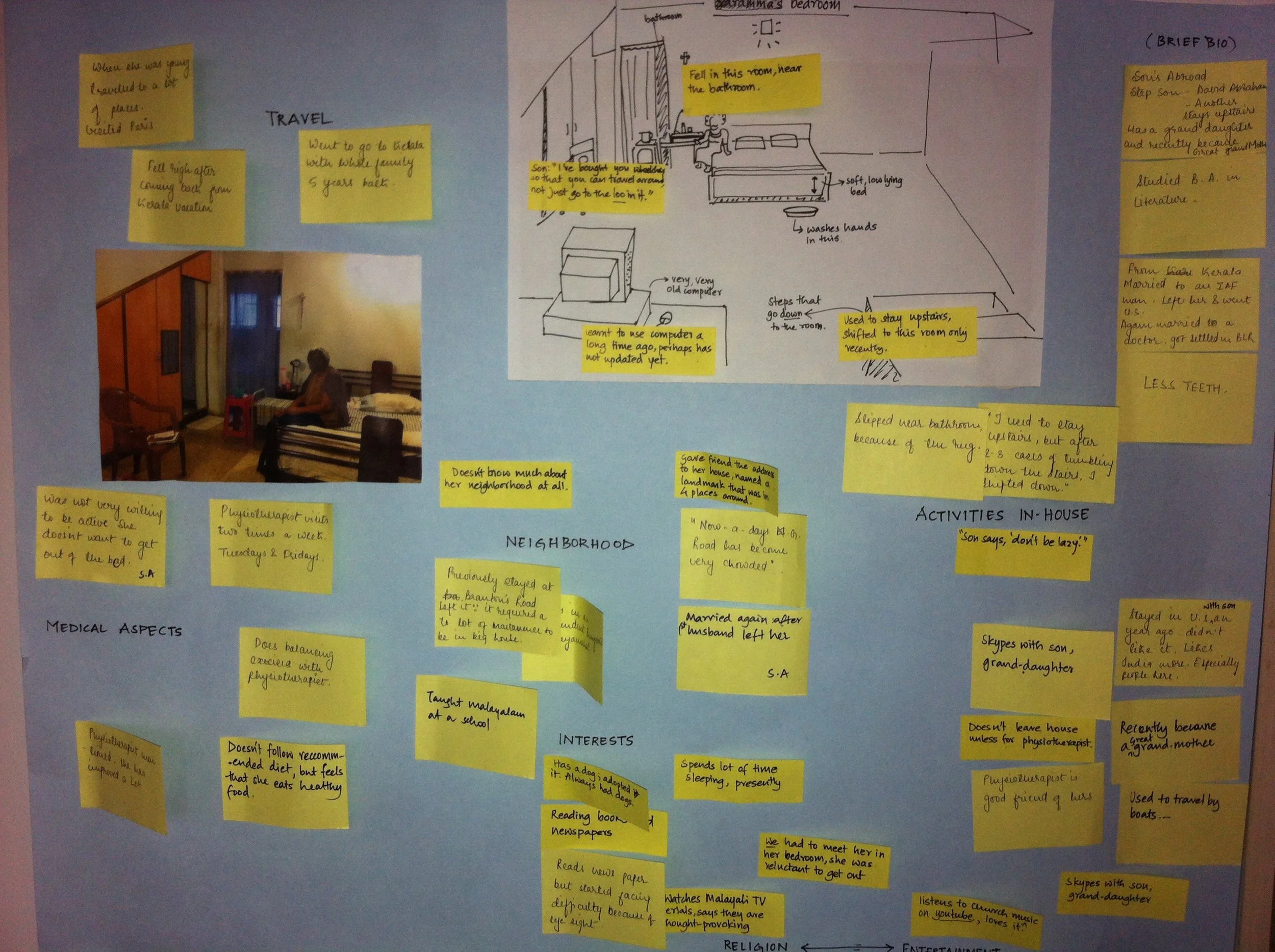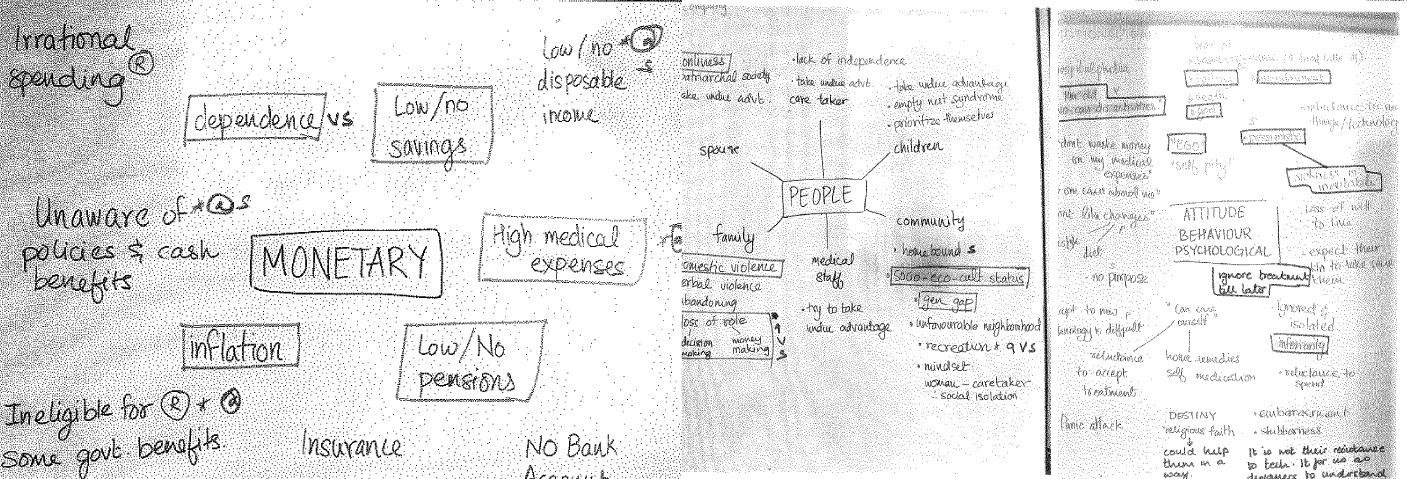Role : Research | Synthesis | Concept development
Duration : 6 months
Research Lead : Naveen Bagalkot
Supporting foundation : Nightingales Foundation, Bangalore
Team : Varun Kurtkoti , Shruti Kabo. Pragya Sharma, Aayushi Bhotica
Project Brief
To explore & build the design space for the design of digital technology enabled services that
enhance adherence to fall preventive rehabilitation amongst Indian senior citizens across clinic and home.
Scope
To understand the current solutions and support the design of rehabilitation for the elderly.
We were tasked to 1) Analyse, 2) Identify pain points, 3) Map and create affinity groups, 4) Design interventions
Vision Statement
Ensure fall prevention and rehabilitation amongst the urban elderly, by motivating* them to actively maintain their physical well being.
*Motivating : used as an emotional tool.
The Context
India is facing a challenge posed by an increasing number of elderly citizens. By 2050, over thirty per cent of India’s population will be sixty-five or older [OECD, 2009]. Most senior citizens traditionally were used to being taken care of by their children and grandchildren. However with the growing concept of nuclear families and the elderly living away from their children, there is a longing for social interaction with relatives.
Decreased mobility makes rehabilitation post a fall difficult for most. This leaves senior citizens inactive and dependent. With no motivation, this becomes a permanent state for most which is why 1/3rd of them fear falling.
Mapping our understanding
The 3 core problem areas we looked at are the reasons for falling, post fall and other health issues. A lot of the wicked problems behind these are interconnected and hence it helped us identify & build relations.
Secondary research
While clustering together the teams secondary research, we were able to group them into some broad categories such as : Medical, Economic, Social, Emotional, Tech & General.
Purpose and role :
A low sense of self-efficacy is associated with depression, anxiety, and helplessness [Bandura, 1993]
No disposable income :
Directly proportional to reduced independence.
I am old, I can’t do activities.” :
Phobias and myths related to ageing have a huge impact on the psychology of the elderly.
Monetary dependence :
Reciprocity is a key factor in shaping a sense of belonging to a community [Ryan et al, 2006]. When a person is receiving more than giving, it can undermine a sense of self-worth and independence.
Fear of falling :
As the elderly become more aware about the repercussions of falling and hurting themselves, the fear of that prevents them from engaging in everyday activities.
Recreation :
Lack of recreational activities making them home bound
Primary research
Protocol
1. Consent Form, Questionnaire & Inclusion Criteria
2. Expert & User interviews (someone who has suffered a fall + spouse)
Tools and Activities
1. Day in life of participants
2. Activity mapping
“At night I went to check if the gas was off, everything was fine. However when I turned I fell. After that all the time in my head I am thinking that I might fall. My doctor recommended me to take treatment. I would call her in the middle of the night and tell her that I am getting scared.”
- 71 YEARS | FEMALE | STAYING WITH FAMILY
After my husband died of cancer 2 years ago the loneliness has been eating me up. I get anxiety attacks. I don’t know how to spend my time. I joint an old age home as well but I decided to go back home soon. I kept a maid, however in the evening I get terribly lonely
- 64 YEARS | FEMALE | STAYING ALONE
“My orthopaedics doctor has given me a few exercises to strengthen my calf muscles and balance. However the exercises my sister has given me are very good. I look at youtube videos that she sends me and do my exercises. She went on to show us some exercises which she did perfectly but she felt she was losing her balance.”
- 68 YEARS | MALE | STAYING WITH SPOUSE
“I love watching prayer channels at home on tv. I like music as well. My wife and I love experimenting with our music. We listen to some English and Hindi music. Sometimes even classical.”
- 65 YEARS | COUPLE | STAYING WITH SON
“Doctors should give concessions to senior citizens. India has no policies and doesn’t care about us. Abroad the government provides old age homes. These are quite expensive here and not very accessible. They do provide travel concession but I barely travel alone. I can’t drive now as my license has expired. My daughter usually takes me out.”
- 74 YEARS | MALE | STAYING WITH SPOUSE
I got married when I was very young. I didn’t have too many friends. My husband kept asking me why don’t you have any friends? Which is why I don’t know where to go now. I spend most of my time at home.
- 60 | FEMALE | STAYING ALONE
Chunking up & down insights
Once we collated all our insights, it was important to do this exercise before we went on to make inferences.
Actionable Research Insights
Brainstorming & Implication framework
Conceptualising Solutions
Concept 1 : Using everyday objects
Everyday objects can be good starting points of motivation. RFID tags attached to these objects will allow the elderly to involve these object into their daily exercise regime via guided videos on their smartphone.
Concept 3 : Professional tracking + Personal exercise buddy
A physiotherapist can track a patients progress via their personal exercise buddy. Patients can have this device in their house that will show and record their daily exercise regime.
Concept 2 : Music as a tool + Social connections
Music is used as a persuasive tool to nudge the elderly into achieving their fitness goals. A friend or family member celebrates and nudges them to perform better and can reward them with unlocking more music of their choice.
Concept 4 : Professional Buddy System
Professional doctors can help the elderly by giving them a buddy to help motivate them to be active. Both of them together need to achieve weekly challenges received via their smartphone.






































